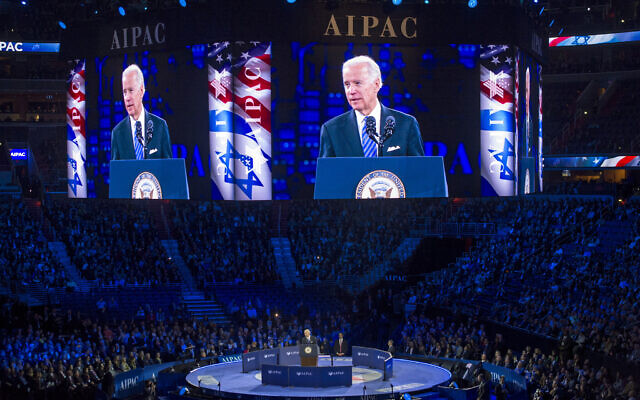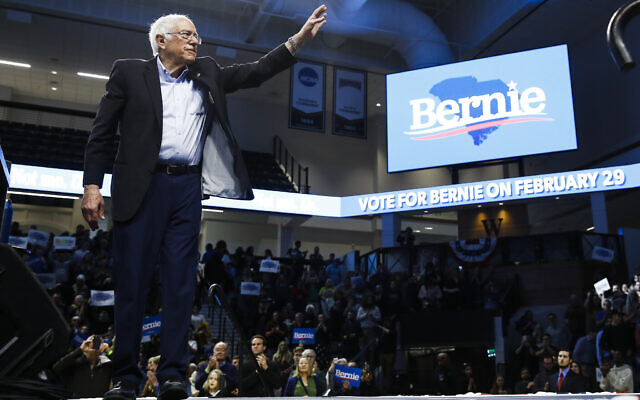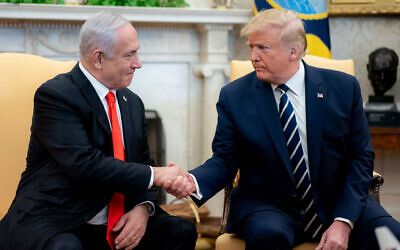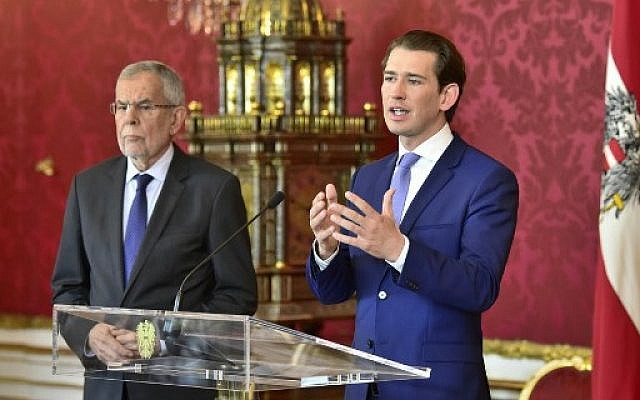After Sanders and other Democrats decline to speak at annual conference kicking off Sunday, the powerful lobby sets out to showcase bipartisanship

WASHINGTON — More than 18,000 people will attend the American Israel Public Affairs Committee’s policy conference this week. If the pro-Israel lobby wants them to walk away with at least one message, it’s this: the organization remains fervently committed to cultivating bipartisan support on Capitol Hill.
After Democratic presidential frontrunner Bernie Sanders announced last week that he would skip the AIPAC confab — saying it gave a platform to “express bigotry and oppose basic Palestinian rights” — the powerful group has emphatically tried to illustrate that it has not completely alienated the American left.
The day after Sanders’ statement, it announced several prominent congressional Democrats who will attend — including Senate Minority Leader Chuck Schumer and Congressman Hakeem Jeffries, one of the House managers in President Donald Trump’s impeachment trial — and changed its rules to allow presidential hopefuls to speak via video.
In 2016, AIPAC denied Sanders’ request deliver his speech remotely.
The conference will take place at the Walter Washington Convention Center in Washington, DC, from March 1-3. The last day coincides with Super Tuesday, considered among the most important days in the Democratic primaries because of the number of states and delegates at stake.
Thanks to the new rules, former vice president Joe Biden, Minnesota Senator Amy Klobuchar and former South Bend mayor Pete Buttigieg will address the gathering video satellite. Former New York mayor Michael Bloomberg will speak in person, the only 2020 Democratic candidate who will do so.

Elizabeth Warren, like Sanders, declined AIPAC’s invitation.
The absences are seen as a reflection of the fact that AIPAC has been increasingly seen as a bastion of the right. The group’s opposition to the Obama administration on the Iran nuclear deal and embrace of the Trump administration’s divisive Israel policies has made it politically toxic to ascendant corners of the Democratic Party, exemplified by progressives like Sanders and Warren.
AIPAC has attempted to push back against that characterization, and its play to burnish progressive bona fides will also go beyond the who’s who of politicians to take the stage or speak remotely.
According to a summary of the conference the group sent to reporters, the group will be “hosting several breakout sessions and receptions celebrating the progressive aspect of the US-Israel relationship.”
That will include a soirée for “LGBTQ+ and Allies Supporters” and breakout sessions titled: “Fostering Coexistence: Israel and Palestinians Working Together Under the Radar Breakout Session,” “Going Green: Israel and the Environment,” “Zionism and Feminism: A Report from the Field.”
At the same time, the conference will host several prominent members of the Trump administration. Vice President Mike Pence, Secretary of State Mike Pompeo and US Ambassador to Israel David Friedman will all speak during plenary sessions.
They are likely to receive warm welcomes from the crowd, which tends to be right-leaning, over several policy decisions the White House has made over the last year amenable to the current Netanyahu government, including recognizing Israeli sovereignty over the Golan Heights, saying that settlements do not violate international law, and rolling out the long awaited Trump peace plan, which was widely seen as favorable to Israel.
Breaking with past US administrations, the Trump team released a proposal that envisions the creation of a Palestinian state in about 70% of the West Bank, a small handful of neighborhoods in East Jerusalem, most of Gaza and some areas of southern Israel — if the Palestinians recognize Israel as a Jewish state, disarm Hamas and other terror groups in the coastal enclave, and fulfill other conditions.
The proposal also allows Israel to annex settlements, grants the Jewish state sovereignty over the Jordan Valley and overriding security control west of the Jordan River, and bars Palestinian refugees from settling in Israel.
Trump himself will not speak.
Also not appearing in person will be either of the two main Israeli contenders for the prime minister’s office: Likud head Benjamin Netanyahu and Blue and White leader Benny Gantz. Both will address the confab by video.

They, along with many other Israelis, will be skipping flying to Washington with the country going to the polls on Monday, leaving the conference hall bereft of almost any Israeli politician or senior official.
Israelis are also being advised by their government not to travel abroad over fears of contracting the coronavirus.
A number of foreign heads of state, however, will be in attendance, including Austrian Chancellor Sebastian Kurz; Guatemalan President Alejandro Giammattei; and Serbian President Aleksandar Vučić.
Some of those speakers have already generated controversy. The far-left group IfNotNow, which had been driving a pressure campaign to prevent 2020 Democrats from attending the confab, has criticized the lobby for hosting Kurtz and Vučić.
Kurtz formed a coalition government in 2017 with the Freedom Party, which was founded by neo-Nazis. Vučić has been castigated for denying the 1999 Recak massacre, which he has called “fabricated.”

The conference will be topped off by a traditional lobbying day on Capitol Hill on March 4, as many of the attendees make their way down the street to urge members of Congress to support an Israel-friendly set of legislative priorities.
Historically, that has included pushing for strong security aid to Israel and a robust response to Iran’s activities in the region. This year is no different.
According to AIPAC’s Policy Conference Summary, the lobby will push Congress to maintain the $3.8 billion in annual aid to the Jewish state, as agreed upon in a Memorandum of Understanding between the Obama Administration and the Netanyahu government.
The other two asks will be urging Congress to ask the United Nations Security Council to extend the UN arms embargo and ballistic missile restrictions on Iran that expire October 2020 and to continue supporting Israel at the International Criminal Court at The Hague.
In both instances, AIPAC is trying to collect signatures from members of Congress to back these initiatives.
As reported by The Times of Israel
